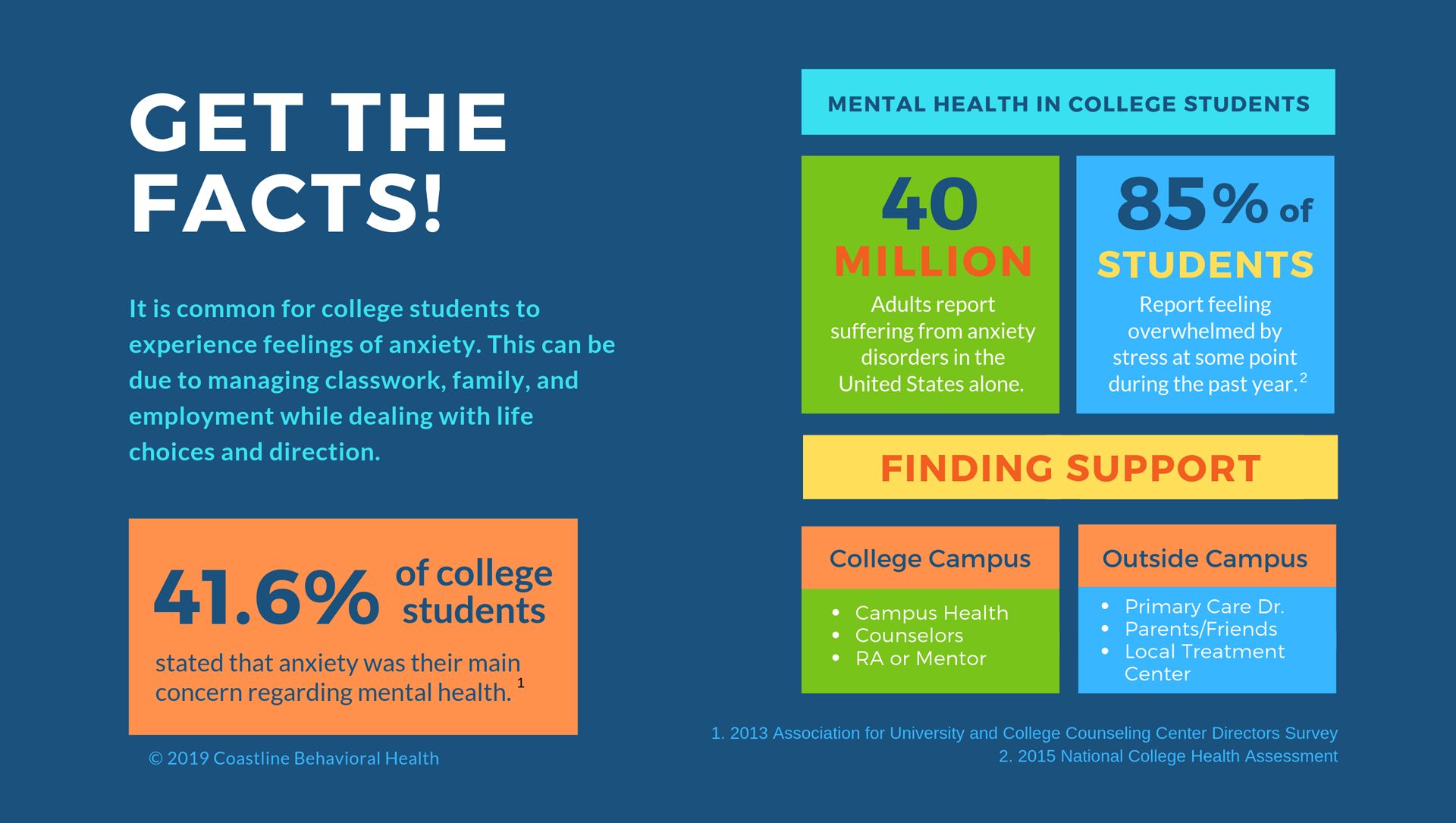
For many college-age students just like you, the transition from high school to dorm life can be a major adjustment. Surrounded by new peers and pressures, you may be focusing on how you are coping as compared to your friends. Perhaps you are seeking new peer groups that make you feel comfortable and wanted.
You may be dealing with mental health issues such as depression or anxiety or issues with substance abuse. Like so many other college-age students, you are probably looking for clues that others are struggling as well. Perhaps you are hoping to see signs that some peers are dealing with the same mental and behavioral health struggles that you are.
This is normal. It protects you from feeling like you are you alone in your fears, anxieties, or even your possible addictions. It can be difficult to distinguish what appropriate responses to your stress levels should be, and so many students find other alternative ways to deal with pressures and anxieties. Some of these may include partying, underage drinking or recreational drug use.
Do you find yourself asking questions like these?
It is important that you understand that you are not alone.

As you can see, statistics have shown that over 41% of all college students express that anxiety is their prevailing mental health concern. It has been said that this number is low and that many more students experience high levels of anxiety on a regular basis. 1 The fact that 85% of college students report overwhelming stress during the course of a year is worrisome.2 Should you feel that you are part of this statistic, there are many resources available to you.
Stephanie Lake, Intervention Services Coordinator within University of California Davis' Student Health and Counseling Center, shared her insight on the growing trends on college campuses.
“At UC Davis, we are always compiling statistics within our own student demographic. We create information reports specific to Davis’ own students to aid with recognizing substance use vs substance abuse. The data collected is structured into charts that include alcohol and drug statistics allowing students to see where their own drinking or pill popping compares to other students within the Davis student body.”
Stephanie has worked with the UC Davis students for 20 years and her focus of expertise is substance abuse and mental health intervention. Through this work with students, she has helped shape the landscape of care within their on-campus Health Services Center.
Here are a few more interesting facts. A 2015 study1 performed by the Center for Collegiate Mental Health reports a 30% jump in college counseling center visits. Even when taking enrollment rates into account, the overall increase is over 24%. The timing of these increased visits seems to coincide with midterms and finals, traditionally very stressful times for college students.
Stephanie understands that students within UC Davis, and other campuses, will often avoid reaching out for counseling or treatment because they fear their peers with know.
“There is a stigma that runs through society that can discourage students from receiving the help that they want and need. This stigma is the link between substance abuse and mental health issues. The rate of this co-occurrence is near 80%, a staggering number when we think about it.
Students want to feel normal. They want to be seen as healthy, which is how they perceive their peers. What we have to remind them is that looks can be deceptive.
We have set up our waiting rooms as a part of the acute care center. This way students can wait in anonymity. They are called back just as students with other health issues are. This makes reaching out for care less stigmatizing. “
You may be so busy filling your schedule with classwork, activities, and relationships, that feeling stretched becomes normal. Living on or off campus, students are surrounded by peers walking through the same life phase, and some can quickly lose perspective. Popping pills to relieve anxious thoughts or binge drinking to escape feelings of depression has become accepted behavior on many college campuses. In fact, the SAMHSA, or Substance Abuse and Mental Health Services Administration, cited these statistics in their 2014 study2 regarding substance abuse among college students.
Self-medication to deal with the stresses of college life is commonplace. Stephanie shares the foundation of replacement counseling at UC Davis.
“We help students recognize that self-medication isn’t the only way to deal with the intense pressure to succeed. Encouraging students to replace substance abuse with healthier options such as a favorite hobby or activity often helps.”
So, perhaps you are reading this article and thinking about what campus life is really like for you in 2019. The stories your parents shared about when they lived on campus probably seem a bit outdated. There may be more than a few reasons why you may feel that drug and alcohol abuse isn’t as big a deal as it used to be. Some of these include:

There are some basic signs and symptoms of substance abuse.
Most college campuses have a student health services department. These services are often low-cost or free of charge to students who have paid a health fee. Some of the common services are medical health care and psychological therapy. This would include seeing a mental health therapist for issues involving your anxiety or depression.
Your college may have a chaplain or religious leader available to meet with you about any concerns you may have on a spiritual level. Look at your school’s online department directory to find out whether you have one on campus.
Residential advisors (RAs) are common at schools where students live on campus. While their availability may vary, they do live on the floors with the students, so it would be easy to drop in for advice. RAs are not able to provide psychological or substance abuse support, but they can often function as a mentor and help you find the professional help you are looking for.
Your family physician is often a good resource for help and referrals as they likely already have any pertinent medical records on file. Often, your primary care doctor can send you to a professional that deals with anxiety disorders in college students or depression treatment for young adults.
Leaning on a family member you trust to support you can actually relieve the stress and anxiety of seeking treatment for substance abuse or mental health issues. You can look for local support groups in your area that offer opportunities to share your substance abuse history with and find out about local treatment facilities.
Finding a treatment center that specializes in drug and alcohol abuse and addiction recovery can save your life. While the choices that you will make while in drug rehab can change your life, your trust in the center’s staff and programs is vital.
The length and type of addiction treatment program will depend on the length, severity, and type of substance abuse you are dealing with. Rehab centers often support clients with dual diagnosis programs. This means that they are able to help you with your mental health and addiction issues at the same time. Their staff will be highly trained in both behavioral health and physical health, working alongside you to ensure that you make sobriety your focus.
1. CCMH 2015 Annual Report https://sites.psu.edu/ccmh/files/2017/10/2015_CCMH_Report_1-18-2015-yq3vik.pdf
2. SAMHSA 2014 Annual Report https://www.samhsa.gov/data/sites/default/files/report_2049/ShortReport-2049.pdf
Drug Rehab SEO. Addiction treatment centers operated in California by Crescent Moon Rehab Center Orange County LLC